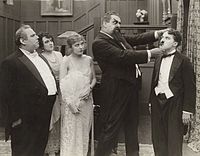The Adventurer (1917 film)
This article needs additional citations for verification. (July 2012) |
| The Adventurer | |
|---|---|
 Theatrical release poster | |
| Directed by | Charles Chaplin Edward Brewer (technical director) |
| Written by | Charles Chaplin (scenario) Vincent Bryan (scenario) Maverick Terrell (scenario) |
| Produced by | John Jasper |
| Starring | Charles Chaplin Edna Purviance Eric Campbell |
| Cinematography | Roland Totheroh George C. Zalibra |
| Edited by | Charles Chaplin |
| Distributed by | Mutual Film Corporation |
Release date | October 22, 1917 |
Running time | 31 minutes |
| Country | United States |
| Language | Silent (English intertitles) |

The Adventurer is an American short comedy film made in 1917 written and directed by Charlie Chaplin, and is the last of the twelve films made under contract for the Mutual Film Corporation.
Plot and characters
Charlie Chaplin plays an escaped convict from the state penitentiary who, clad in his striped prison uniform, is on the run from prison guards. He skillfully and athletically manages to elude a handful of guards at a rocky seashore, eventually making his escape by entering the water. Charlie opportunistically happens upon a man in a rowboat who is preparing for a swim. Charlie steals the man's swimsuit and heads to shore. He hears cries for help as a woman (Edna Purviance), her mother, and the woman's suitor (Eric Campbell) have all fallen into the water and are poor swimmers. Charlie rescues them all, but carelessly allows the enormous suitor to fall back into the water while he is attempting to carry him on a stretcher. Charlie rescues him once again, but the angry suitor kicks Charlie senseless into the water. Charlie wakes up in a bedroom in the lavish home of the grateful girl and her mother. He is wearing striped pajamas and for a moment he believes he is back in prison. He identifies himself as a yachtsman and is given a set of evening clothes to wear to a party. Charlie's luck begins to run out, however. The girl's father turns out to be the judge who sentenced Charlie to a prison term. Charlie looks vaguely familiar to the judge, but he cannot quite place him. The suitor, now especially miffed at Charlie because of the attention the girl is giving him, sees Charlie's photo in a newspaper as a prison escapee. Meanwhile, a house employee is feeding her beau a meal in the kitchen; the beau happens to be one of the guards who was chasing Charlie on the beach. The suitor summons the authorities who pursue Charlie on a merry chase up and down the two-story house where Charlie's acrobatic skills save him from arrest several times. Just as it looks like Charlie will finally be apprehended, he cleverly escapes again and the chase is renewed.
The film also stars Henry Bergman and Albert Austin, and marked the final film of his co-star Eric Campbell who died on December 20, 1917 in a drunk driving accident.[1] Campbell, who was 37 at the time of his death, had appeared in 11 comedies with Chaplin in 1916 and 1917.
Toraichi Kono, who was Chaplin's personal chauffeur for many years, plays a small part in the film. He was aptly cast as the chauffeur of the girl and her mother.
Cast
- Charles Chaplin - The Convict
- Edna Purviance - The Girl
- Eric Campbell - The Suitor
- Henry Bergman - The Father
- Albert Austin - The Butler
- Marta Golden - The Girl's Mother
- May White - Lady
Critical reception
A re-release of the film inspired this enthusiastic review in the August 16, 1920 New York Times. This was written during a period in which Chaplin's film output was practically nonexistent.
"On the Rivoli program, and also at the Rialto, is a Chaplin revival. The Adventurer, which makes one wish, between laughs, that the screen's best comedian would get to work and do what everyone knows he is capable of. There is a slap-stick coarse humor in The Adventurer, but also some of Chaplin's most irresistible pantomime."[2]
Sound version
In 1932, Amedee Van Beuren of Van Beuren Studios, purchased Chaplin's Mutual comedies for $10,000 each, added music by Gene Rodemich and Winston Sharples and sound effects, and re-released them through RKO Radio Pictures. Chaplin had no legal recourse to stop the RKO release.[3]
See also
References
- ^ "Charlie Chaplin's "The Adventurer" (1917)". Retrieved 19 February 2013 – via Internet Archive.
- ^ Movies2.nytimes.com
- ^ SilentComedians entry Archived 2014-01-12 at the Wayback Machine
External links
- The short film The Adventurer is available for free viewing and download at the Internet Archive.
- The Adventurer at IMDb
- The Adventurer on YouTube
